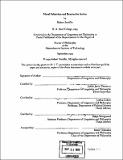| dc.contributor.advisor | Judith Jarvis Thomson. | en_US |
| dc.contributor.author | Streiffer, Robert (Robert Keith), 1970- | en_US |
| dc.contributor.other | Massachusetts Institute of Technology. Dept. of Linguistics and Philosophy. | en_US |
| dc.date.accessioned | 2009-01-13T19:13:01Z | |
| dc.date.available | 2009-01-13T19:13:01Z | |
| dc.date.copyright | 1999 | en_US |
| dc.date.issued | 1999 | en_US |
| dc.identifier.uri | http://dspace.mit.edu/handle/1721.1/9369 | en_US |
| dc.identifier.uri | http://hdl.handle.net/1721.1/9369 | |
| dc.description | Thesis (Ph.D.)--Massachusetts Institute of Technology, Dept. of Linguistics and Philosophy, 1999. | en_US |
| dc.description | Includes bibliographical references (p. [103]-105). | en_US |
| dc.description.abstract | There are many varieties of moral relativism. Appraiser relativism, according to which the proposition expressed by a moral sentence varies from context to context, is motivated by the thought that it provides the best explanation of the intractability of fundamental moral disagreements. In response, it is standardly objected that appraiser relativism runs afoul of our linguistic intuitions about when people are contradicting one another. In Chapter One, I expand upon this objection in three ways: (i) the problematic class of intuitions is larger than has previously been noticed; (ii) three strategies that have been offered to explain away those intuitions fail; and (iii) even if we grant that appraiser relativism is true, it still would not provide us with any explanation whatsoever of the intractability of the relevant disagreements. Agent relativism, according to which there are no universal moral requirements, is motivated by the thought that there are always reasons to comply with one's moral requirements, but that the desires to which such reasons would have to correspond are too capricious for there to be any universal moral requirements. In Chapter Two, I argue that the moral universalist is free to maintain either (i) that any fully rational, fully informed agent will have a desire that would be served by complying with what the moral universalist takes to be universal moral requirements, and so desires are not too capricious, or (ii) that a naturalistically acceptable account of reasons need not suppose that reasons are grounded in desires. Either way, the moral universalist is free to reject this motivation for agent relativism. If desires do not provide the basis for reasons for action, what does? In Chapter Three, I give an analysis of reasons for action based on the ways in which an action can be good or bad. I argue that the analysis is preferable to two other analyses, and that it provides a promising explanation of why there are always reasons for agents to comply with their moral requirements. I conclude, however, that the analysis relies on distinctions which, despite being intuitively plausible, remain in need of theoretical justification. | en_US |
| dc.description.statementofresponsibility | by Robert Streiffer. | en_US |
| dc.format.extent | 105 p. | en_US |
| dc.language.iso | eng | en_US |
| dc.publisher | Massachusetts Institute of Technology | en_US |
| dc.rights | M.I.T. theses are protected by
copyright. They may be viewed from this source for any purpose, but
reproduction or distribution in any format is prohibited without written
permission. See provided URL for inquiries about permission. | en_US |
| dc.rights.uri | http://dspace.mit.edu/handle/1721.1/9369 | en_US |
| dc.rights.uri | http://dspace.mit.edu/handle/1721.1/7582 | en_US |
| dc.subject | Linguistics and Philosophy. | en_US |
| dc.title | Moral relativism and reasons for action | en_US |
| dc.type | Thesis | en_US |
| dc.description.degree | Ph.D. | en_US |
| dc.contributor.department | Massachusetts Institute of Technology. Department of Linguistics and Philosophy | |
| dc.identifier.oclc | 44803792 | en_US |
